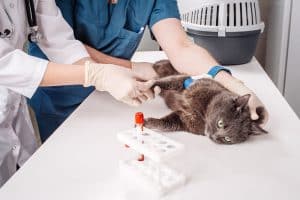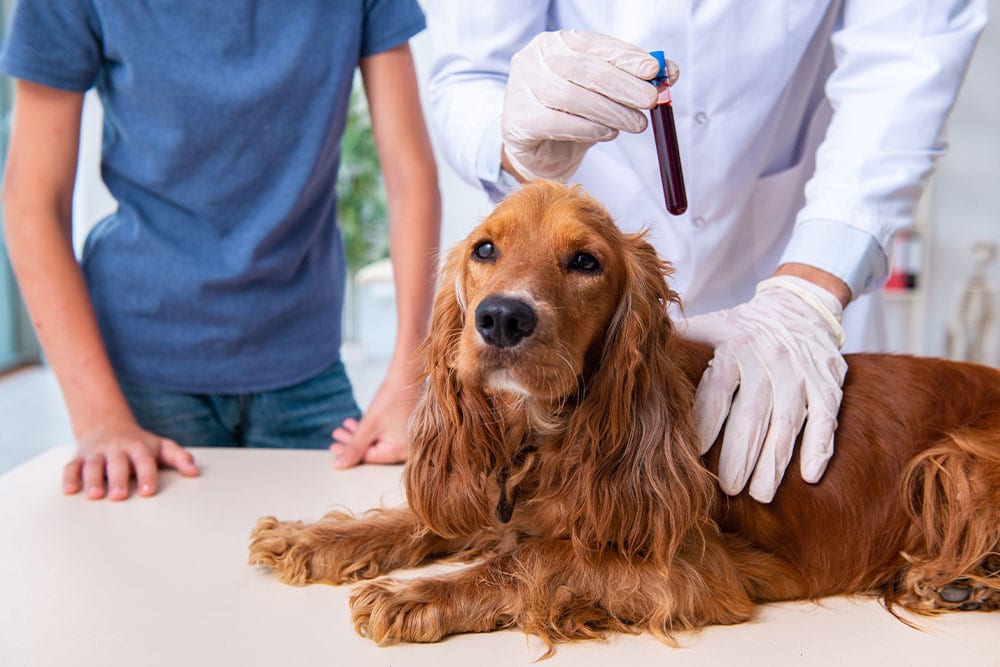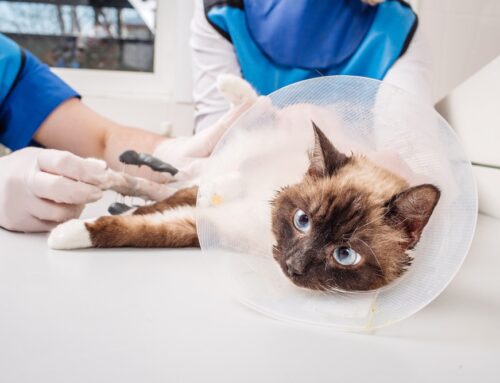Routine veterinary check-ups are essential for keeping your pet healthy, but annual bloodwork provides a deeper level of insight into their well-being. Just like in human medicine, blood tests help veterinarians detect early signs of disease, monitor organ function, and track long-term health trends before symptoms appear.
At Spring Branch Veterinary Hospital, we emphasize proactive, preventive care to help pets live longer, healthier lives. This guide explains why annual bloodwork is a vital part of pet healthcare, what the tests reveal, and how they can help catch potential issues before they become serious.
Why Is Annual Bloodwork Important for Pets?
Many pets show no visible signs of illness until a disease has progressed. Annual bloodwork helps identify hidden health problems, allowing for early intervention and less invasive, more effective treatments.
Key Benefits of Routine Blood Testing
- Early Disease Detection – Identifies kidney disease, liver disease, diabetes, and thyroid disorders before symptoms develop.
- Monitoring Chronic Conditions – Ensures that pets with ongoing medical issues (e.g., diabetes, kidney disease) receive appropriate treatment adjustments.
- Medication Safety – Tracks how long-term medications affect organ function and overall health.
- Baseline Health Data – Establishes normal values for your pet, making it easier to detect even subtle changes in future tests.
Learn more about preventive veterinary care in the AVMA’s Guide to Wellness Exams.
What Does Routine Bloodwork Test For?
A comprehensive blood panel provides an in-depth look at your pet’s overall health. Common tests include:
1. Complete Blood Count (CBC)
- Detects infections, anemia, clotting disorders, and immune system abnormalities.
- Monitors white blood cells, red blood cells, and platelets.
2. Blood Chemistry Panel
- Evaluates kidney, liver, and pancreas function.
- Identifies electrolyte imbalances and metabolic disorders.
3. Thyroid Function Tests
- Dogs are prone to hypothyroidism, which causes weight gain, lethargy, and coat changes.
- Cats commonly develop hyperthyroidism, leading to weight loss, excessive appetite, and hyperactivity.
4. Electrolyte and Urinalysis Tests
- Assesses hydration, kidney function, and potential urinary tract infections.
- Provides a more complete picture of overall health.
Learn more about what blood tests reveal in this guide on The Importance of Bloodwork for Your Dog.
How Annual Bloodwork Detects Disease Early
1. Kidney Disease
- Symptoms often don’t appear until 75% of kidney function is lost.
- Early detection enables dietary changes and medications to slow progression.
2. Diabetes
- Elevated glucose levels signal diabetes before symptoms arise.
- Early intervention includes diet modifications, exercise, and medication.
3. Liver Disease
- Bloodwork detects elevated liver enzymes before symptoms like jaundice or vomiting occur.
- Early treatment can prevent irreversible liver damage.
Learn more about senior pet health concerns in the AAHA Guide to Aging Pet Health.
When Should Pets Start Regular Bloodwork?
The right time to begin routine blood testing depends on your pet’s age, breed, and medical history.
- Young Adult Pets (1-6 years old): Establishing baseline values for future comparison.
- Senior Pets (7+ years old): Essential for detecting age-related conditions early.
- Pets on Long-Term Medications: Ensures treatments remain safe and effective.
- Breeds with Genetic Risks: Certain breeds are prone to kidney disease, heart disease, or metabolic disorders, making early screening vital.
What to Expect at Spring Branch Veterinary Hospital
At Spring Branch Veterinary Hospital, we make blood testing as stress-free as possible for both pets and owners.
- Experienced, compassionate handling minimizes pet anxiety.
- State-of-the-art diagnostic technology ensures fast, accurate results.
- Pre-test consultations help pet owners understand the process and ask questions.
Meet our expert veterinary team here.
How to Prepare Your Pet for Bloodwork
In some cases, fasting is recommended before blood tests to ensure accurate glucose and lipid readings.
Steps to Prepare for Your Pet’s Blood Test
- Follow any fasting instructions from your veterinarian.
- Ensure your pet is calm and comfortable before the visit.
- Bring favorite treats or toys to ease anxiety.
- Inform us about any medications or recent health concerns.
Understanding Your Pet’s Bloodwork Results
Bloodwork results can be complex, but our veterinarians will explain the findings in clear, simple terms. If abnormalities are detected, we will discuss:
- What the results mean for your pet’s health.
- Recommended next steps (further testing, lifestyle changes, or treatment).
- Long-term monitoring plans to track changes over time.
We believe in proactive care—catching problems early, before they become serious or costly to treat.

Frequently Asked Questions About Pet Bloodwork
How often should my pet have bloodwork?
Annual bloodwork is recommended for healthy pets, while senior pets or those with chronic conditions may require testing every six months.
Is bloodwork safe for my pet?
Yes! Blood tests are minimally invasive and performed with care to ensure your pet’s comfort.
What if my pet is nervous about vet visits?
Bringing a favorite toy or blanket can help. We also use gentle, stress-free handling techniques.
Can bloodwork detect cancer?
While abnormal bloodwork can indicate cancer, further diagnostics, such as imaging and biopsies, may be needed for confirmation.
Schedule Your Pet’s Bloodwork at Spring Branch Veterinary Hospital
Annual bloodwork is a critical part of preventive healthcare, helping to detect disease early, improve treatment outcomes, and extend your pet’s lifespan.
Book an appointment today and take a proactive approach to your pet’s health!
Why Choose Spring Branch Veterinary Hospital?
- Advanced diagnostic technology for fast, accurate results.
- Compassionate, skilled veterinary team focused on pet well-being.
- Preventive care approach to catch health concerns early.
By prioritizing regular bloodwork, you can help ensure many happy, healthy years with your pet.









Leave A Comment